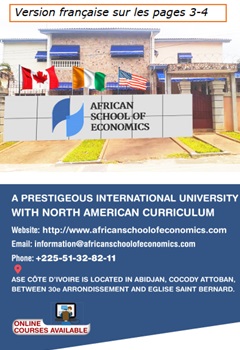In cooperation with the African School of Economics (Cotonou, Benin)
October 11-12, 2018
Download the PEGNet 2018 Conference Call here.
The role played by education in furthering economic growth and sustainable development can hardly be disputed. In recent decades, universal primary education has been made compulsory in most countries and the number of children not attending school has drastically declined. This reduction was mainly driven by developing countries’ commitment to the United Nations Millennium Development Goal (MDG) 2 that aimed to achieve universal primary education by the 2015.
Despite these positive outcomes, more needs to be done to make education accessible for all. Currently there has been a shift in development policy and practice to not only focus on universal access to primary and secondary education but also on the quality of education provided. This policy shift is best reflected in the United Nations’ Sustainable Development Goal (SDG) 4 that aims to ensure inclusive and quality education for all and promote lifelong learning by the year 2030, and the current World Development Report that calls for a stronger focus on improving learning.
The PEGNet conference 2018 will provide a platform for leading development scholars, practitioners and policy makers to reflect on the determinants of poor quality education and learning in developing countries. In addition, the conference will seek to understand the solutions to these challenges and provide answers to questions such as:
- What role can governments and the private sector play in improving learning?
- Are cash transfers that are conditional on educational outcomes effective?
- How can scholarships be better awarded to ensure that poor and marginalized students and pupils have equal access to education?
- What incentives should be provided to increase the motivation and quality of teachers? Should teachers be regularly trained and tested to ensure that they do not fall behind?
- Can new pedagogical approaches such as e-learning technologies improve learning outcomes?
Keynote Speakers
- Felipe Barrera-Osorio (Harvard Graduate School of Education)
- Modibo Sidibe (Duke University)
Conference format
The conference will provide a platform for high-level dialogue and exchange of ideas between development researchers, practitioners and policy-makers. The two conference days will feature parallel sessions based on invited and contributed papers as well as project presentations. In addition, the PEGNet Best Practice Award will be awarded for the tenth time to a project that exemplifies cooperation between development researchers and practitioners. While the plenary sessions will focus on the conference theme, the parallel sessions and Best Practice Award projects are open to all topics in development economics and other related fields.
Selection procedures
We invite submissions of three page extended abstracts or full papers that focus on policy- relevant topics in development economics. Priority will be given to empirical research with clear implications for policy design and implementation. The submissions do not have to address the conference theme.
All submissions should be sent to pegnet@ifw-kiel.de in a pdf or Word file indicating ‘PEGNet Conference 2018’ in the subject heading. The submission deadline is 1 May 2018. Notification of acceptance will be sent out at the end of June 2018. The deadline for full paper submission is 1 September 2018.
For more information on the PEGNet conference please refer to the conference webpage.
Organisers The conference is co-organised by the African School of Economics, the Kiel Institute for the World Economy (IfW), the Deutsche Gesellschaft für Internationale Zusammenarbeit (GIZ) on behalf of the German Federal Ministry for Economic Cooperation and Development (BMZ) and is supported by the KfW Development Bank.
Media partner:



